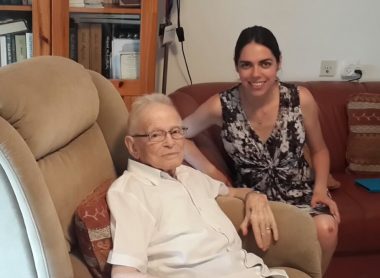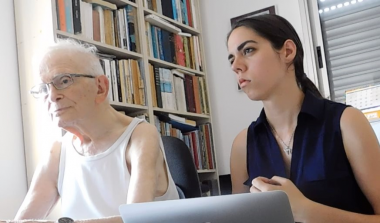Quiqui Lang Hilgartner, adjunct instructor in world languages and cultures, discusses how her summer translation project with a Sephardic Holocaust suvivor has changed her perspective as she begins this new school year.
By Quiqui Lang Hilgartner
Heraclitus’ saying goes something like this, “You never step into the same river twice, for you and the river are never the same.”
 As I return now to teach at Elon for my second year, I can’t help feel like this phrase describes my experience of both change and continuity. Only a few short months have passed since the courses I taught in spring 2017 came to a close.
As I return now to teach at Elon for my second year, I can’t help feel like this phrase describes my experience of both change and continuity. Only a few short months have passed since the courses I taught in spring 2017 came to a close.
Elon’s campus is as beautiful and sunny as ever. The grammatical concepts of the Spanish language haven’t changed, and my love for teaching history, culture, religion and music is as strong as ever. I still find eternal inspiration at the thought that some persistent, curious student (even if a little hesitant and shy) will be empowered by some reading or discussion that we have in class. Some things may never change, but the events of this past summer have indeed changed me, hopefully for the better.
I spent a large portion of the summer working with a Sephardic Holocaust survivor, Moshe Ha Elion, at his home in Bat Yam, Israel. Originally from Thessaloniki, Greece, Moshe was born in 1925. He writes poetry, theatre, and prose in Jewish Spanish, otherwise known as the Ladino language—the ancestral language of the Jews who were expelled from Spain in 1492.
I have spent a lot of time with Moshe over the years, but this summer, the special task was to translate one of his seminal works in rhyming English verse—more of less iambic heptameter. The words in Ladino of “La Djovenika del Lager” are set to music, and it is Moshe’s dream that this piece in English will become the International Hymn of Shoah Remembrance.
 In Israel, the Holocaust is referred to as “Shoah” because the term means “destruction” instead of “sacrifice.” Moshe’s hope is that translating the poem into English will help accomplish the goal of connecting this piece with Israel’s Day of the Shoah (April 11, 2018) as well as International Holocaust Remembrance day (January 27, 2018).
In Israel, the Holocaust is referred to as “Shoah” because the term means “destruction” instead of “sacrifice.” Moshe’s hope is that translating the poem into English will help accomplish the goal of connecting this piece with Israel’s Day of the Shoah (April 11, 2018) as well as International Holocaust Remembrance day (January 27, 2018).
Both the longer poem and the song recount the story of how Moshe’s younger sister, Nina, traveled with their family from Greece to Auschwitz in a repurposed cattle car. The day of their arrival to the camp (lager in Ladino) was the last time Moshe saw Nina and the rest of his family. Nina was sent to join a group of young girls destined for the gas chambers.
The poem does not literally follow Nina’s story; instead it imagines that she survived a few weeks longer. Instead of ending at the gas chambers, the poem projects a journey that more closely resembles Moshe’s own story of survival. Upon disembarking from the cattle car, he too was separated into a group of young men, but instead of being sent immediately to the gas chambers, Moshe was driven to Birkenhau and tasked manual labor.
Although he had many harrowing and unspeakably horrible experiences, miraculously he made it out of seven different camps alive. As I was working with Moshe to translate his poem into English, it became more and more clear to me that not only were we telling the imagined story of his little sister Nina, we were actually recounting Moshe’s lived experience.
One time, I was struggling with how I would find a rhyme that went with “disinfection,” and we were kibitzing about the order of the lines. Moshe explained to me that Nina’s hair was shaved off, then she was sent to the showers, then she got sprayed with pesticides in order to kill off any lice and fleas that came from the cattle cars.
He made a sound with his mouth like shooting air. His little hands tried to mimic the forward motion of the spray towards the head, the body, and the legs. An image of Raid Ant Killer came across my line of vision. When I was little, my mom kept the insecticide and other chemicals in a locked cabinet.
“It’s poison,” she would tell me, “Don’t touch it.” I had to wonder what was it like to be naked in a line, hit with a shot of chemicals, and then given a striped uniform? I had lost my train of thought, and Moshe suddenly seemed exasperated with his capacity to explain, “Tu no imaginas. No es tu caza. Es el lager. Te dan disinfeksion!” He was right. I couldn’t fathom it. We eventually got the rhyme more of less right:
“She finds herself bewildered, as she’s compelled to action:
she goes to showers naked, and then to disinfection.”
It hit me, the “she” is a symbol for Moshe—and more universally for everyone who suffered in the camps during the Shoah. Even now in translating this poem, Moshe and I are not just giving honor to his experience, or Nina’s, or the countless other victims some of whom survived and the majority who did not—through this translation, we are attempting give back in some small way, a voice to anyone who has been maligned, hated, or abused in the name of racism, bigotry, anti-Semitism, misogyny, and discrimination of all kinds.
The Shoah was not just a one-time event that is over. The fight against hatred is current, relevant, and real. The most recent events in Charlottesville reflect this reality once again. I have written here about my experience of learning about the events at my alma mater, the University of Virginia, while sitting beside Moshe.
We watched the TV news together, and I marveled at this strange collision of time and space. How can it be that history still repeats itself? What can I do to stop it? What is the solution to so much wonton strife and hatred? The translation of this poem will not solve the problem in and of itself, but I firmly believe that every effort to seek good and flee evil contributes to the reparation of the world.
And for these reasons and others, I come to my classroom this fall changed—hopefully a little more intentional about the taking up my responsibility to lead in my community here in North Carolina. I come perhaps a little more cognizant of the importance of respect and deference towards others no matter their perceived socio-economic background, skin color, religion, ideology, or any other identifying marker. As I told my students the first day of class, when they cross the threshold and the door shuts behind them, they should be assured that in this space they will be treated with respect, keeping in mind that at the end of the day, we are all students at different stages of academic and personal development.
It’s such a privilege to come back to Elon. Some things have changed; some things stay the same. As part of the Elon community, we have a chance to nourish our intellectual spirits, to be challenged, to take risks, to expand our worldview, and ultimately to live for so many others who never had that chance—and for those who still do not.


